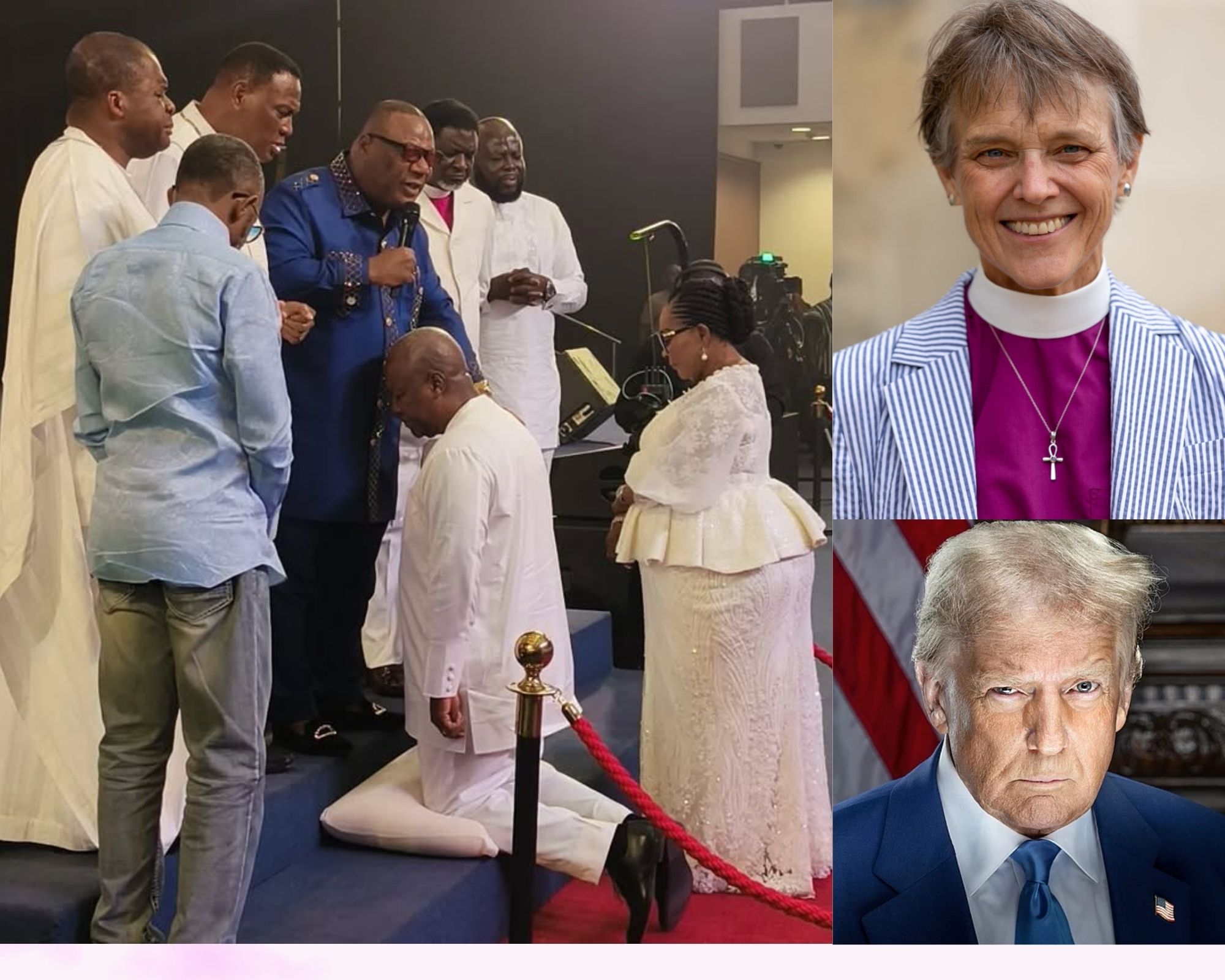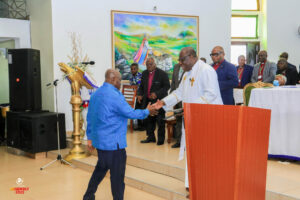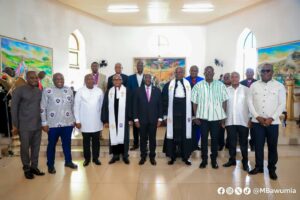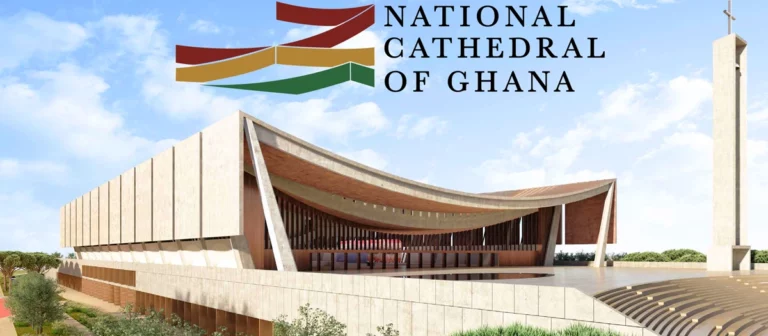Can such a courageous minister rise in Ghana? This question lingered after witnessing the National Prayer Service following President Donald Trump’s inauguration. At the crossroads of faith and politics, where power tests conviction and courage, few dare to speak the truth without fear. Yet, Bishop Mariann Edgar Budde, the Episcopal Bishop of Washington, stood as a beacon of prophetic boldness. With the newly inaugurated President seated before her, she offered no pleasantries or flowery prayers. Instead, she confronted him with the unyielding call of God—justice, compassion, and the moral responsibility of leadership. In that moment, the pulpit reclaimed its power, not as a seat of comfort for the mighty but as a sacred space for truth. Can Ghana’s clergy muster such courage, or will they remain bound by silence? She said,
“Millions have put their trust in you,” she said. “And as you told the nation yesterday, you have felt the providential hand of a loving God. In the name of our God, I ask you to have mercy on the people in our country who are scared now.”
Bishop Mariann Edgar Budde’s words were emphatic; they were piercing, deliberate, and urgent. She did not sugarcoat her message in ambiguity. She made a direct and unflinching plea, urging the President to see the faces behind his policies. The immigrants seeking refuge from violence, refugees running away from war zones, the very people most at risk from the policies he [the President] was eager to enforce. In that sacred space, she did what too many fear to do, holding power accountable to the higher call of justice and compassion.
As I listened to Bishop Budde, I was reminded of the sacred and often inconvenient calling of the church and its leaders—to be the voice of truth in the presence of power, to bring comfort to the afflicted, and to pursue justice for all of God’s creation. Her words echoed the timeless charge of the prophets, those fearless messengers who stood before kings—not out of defiance, but out of an unshakable devotion to justice and mercy, grounded in the very heart of God’s word. It was a call to remember that true faith does not seek the favor of the powerful but dares to hold them accountable.
Her courage stirred a sobering question: Do we have such a fearless and prophetic voice among Ghanaian clergy today? In a nation where faith and politics intertwine, how often do we witness religious leaders standing before the halls of power, not with flattery or empty blessings, but with the unfiltered truth? Where are the voices willing to challenge injustice, hold leaders accountable, and speak not for personal gain but for the voiceless? Or have our pulpits grown too comfortable, too entangled with power to risk the cost of true prophecy?
In Ghana, it is common for political leaders to fill our churches, especially during election seasons and their after-party. They seek spiritual endorsement and visible association, fully aware of the clergy’s immense power and influence over their congregants. For many politicians, visiting our churches is not a personal conviction but a strategic alliance.
Yet, what is disheartening is not their presence in the pews but the response from the pulpits. Too often, pastors, when faced with political power, default to prayer, blessings, and flattery, neglecting the very issues that threaten the soul of the nation—corruption, injustice, and policies that trample the marginalized. The pulpit, meant to be a sacred space for truth, too often becomes a stage for political appeasement. Instead of calling leaders to righteousness, clergy assume the role of intercessors who shower praises even in the face of blatant wrongdoing. Where, then, are the voices of courage? Where are the pastors willing to stand before power and, like Bishop Budde, speak truth boldly? Have we traded the prophetic for the political?
Some insist that our culture frowns upon openly rebuking or reprimanding leaders. But whenever I hear this argument, I can’t help but ask: When corruption runs rampant, when power is abused, and when governance fails the people, which holds greater authority—our culture or the unyielding truth of God’s word?
While Scripture urges us to pray for our leaders (1 Timothy 2:1-2), prayer alone is not a sufficient response to corruption and injustice. A church that only intercedes but never confronts is one with no mission and prophetic edge. The gospel’s call is not merely to bless power but to hold it accountable. When those in authority misuse their power at the expense of the vulnerable, silence from the pulpit is not piety; it becomes complicity. The clergy must reclaim their dual role as intercessors and prophetic voices that challenge corruption, demand justice, and remind those in power that they, too, are subject to a higher authority.
It is no secret that many of our clergy are enticed by the lure of political favor, seeking to remain in the good books of those in power for personal gain and diplomatic privileges. Too many pastors trade their prophetic voice for access to secure a seat at the table of influence. But at what cost? When the clergy becomes a servant to political interests rather than a steward of truth, it erodes the moral authority of the church and its calling to be a voice for the voiceless. We have all witnessed the scandal surrounding the National Cathedral—a project cloaked in piety yet riddled with impunity and corruption. Ironically, none of its board members would ever tolerate such blatant mismanagement within their own churches. Why, then, was it permissible when political power was involved?
The Hebrew Bible is rich with examples of prophets who placed their sacred calling above their personal comfort, choosing courage over safety and truth over appeasement. Figures like Nathan, Elijah, Amos, and Jeremiah exemplified radical obedience to God, even when it meant confronting the most influential figures of their time.
Take Nathan, for instance, who boldly confronted King David with his sin, risking his life to remind the king of his moral failures (2 Sam 12:7-14). He didn’t seek praise or protection; he sought justice. Similarly, when Elijah stood against the wickedness of Ahab and Jezebel, he did not do so to gain influence or political advantage but to uphold the righteousness of God (1 Kg 21:17-24). These prophets did not soften their words to soothe the powerful; instead, they spoke with unwavering conviction, knowing the personal cost of their obedience. They understood that true prophets do not seek comfort in proximity to power but rather demand justice and accountability.
A few bold voices within the clergy are beginning to break the silence. Prophet Kofi Oduro has stood out, fearlessly using his pulpit to address national issues and demand accountability from those in power. But the real question remains: Will his voice endure, or will his voice fade into the background now that there is a new government? For now, such courage is the exception, not the norm. The overwhelming silence of the clergy in the face of corruption and injustice is deeply troubling. How long will the church remain a spectator when it should be the conscience of the nation?
Bishop Budde stands firmly within this prophetic tradition. She calls us to remember that true spiritual leadership demands courage to speak the truth, especially when it challenges power or risks personal harm. Her boldness in addressing President Trump is a stark example for clergy across the globe, including those in Ghana. Her words were not driven by hostility but by a profound conviction that political and spiritual leadership are ultimately accountable to the divine call for justice and mercy. Her prophetic voice reminds us that leadership is not a privilege to be used for self-interest but a sacred responsibility to ensure justice for all, especially the marginalized.
As always, theology is fine! trust me!!
Images: facebook @Mahama
https://dianerehm.org/
Wikipedia-Donald Trump




This is one of the clearest explanations I’ve seen. Thanks!